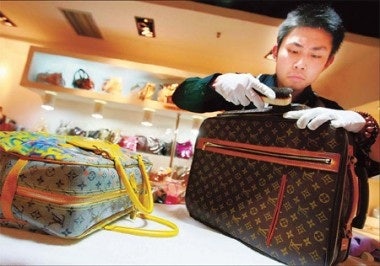Luxury Handbag Mending Services Proliferating In Major Chinese Cities#

Fickle gift recipients or regular shoppers have contributed to the rise of the luxury second-hand shop in China
One of the interesting byproducts of China's booming luxury market has been the appearance of specialized companies providing niche aftermarket services. As mainland Chinese wine collectors and dealers have become a force to be reckoned with at Hong Kong auctions, often bringing home cases of top bottles, entrepreneurs have been quick to build often "bunker-like" wine storage facilities in or near major cities, filling a niche that few would have even thought existed only a few years ago. Private shoppers and stylists, too, have sprung up offering their services to newly wealthy Chinese who could stand to learn a thing or two about fashion and personal style. And considering China has gradually become the land of the handbag -- both among women and men -- now some enterprising individuals are catering to one of the less glamorous sides of the luxury world: maintenance.
This week, China Daily profiles one store, Shanghai's Sac Igant, which specializes in cleaning and mending services. With China's handbag market reaching US$1.2 billion last year, and fickle gift recipients or shoppers fueling the country's second-hand and consignment stores, the potential is huge for well-trained luxury maintenance professionals, and entrepreneurs are all too eager to exploit this niche. From China Daily:
While a luxury bag has become a must-have for the well-off in China, those who own them are becoming increasingly aware that you have to look after them too. Hence, the spread of luxury bag mending shops that provide efficient, personalized and professional standards of service.
"Young people appreciate luxury and it is essential to be able to distinguish between colors and different types of leather. Seemingly trivial differences can mean a lot," says Sac lgant's owner Duke Du.
...
[Du] started his store when his patent leather shoes were practically ruined by a cobbler. "My shoes had been left in the sun and had dried out," he says, which prompted him to think about how service for leather goods could be improved.
According to the 2010 Hurun Wealth Report, there are 875,000 millionaires in China. This enormous market potential has attracted the luxury brands. According to a report released by BCG in 2010, the quantity of luxury stores in Shanghai and Beijing has already exceeded the number in New York and Chicago. What is more, some second-tier cities in China are now welcoming these big brands.
While luxury-focused maintenance and repair stores like Du's are a good idea, it will perhaps be difficult for them to establish trust with customers, which is why word-of-mouth is so critical. Another major concern of Du's is that old inevitability in successful niche markets -- the rise of the cheaper, poorly trained copycat repair shop.